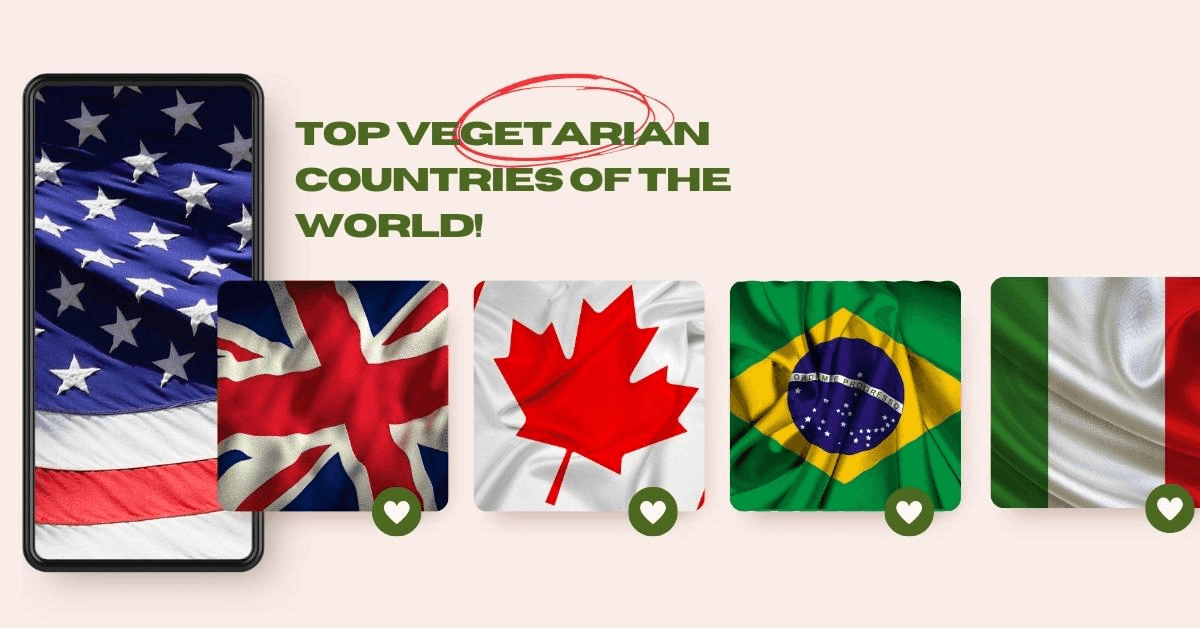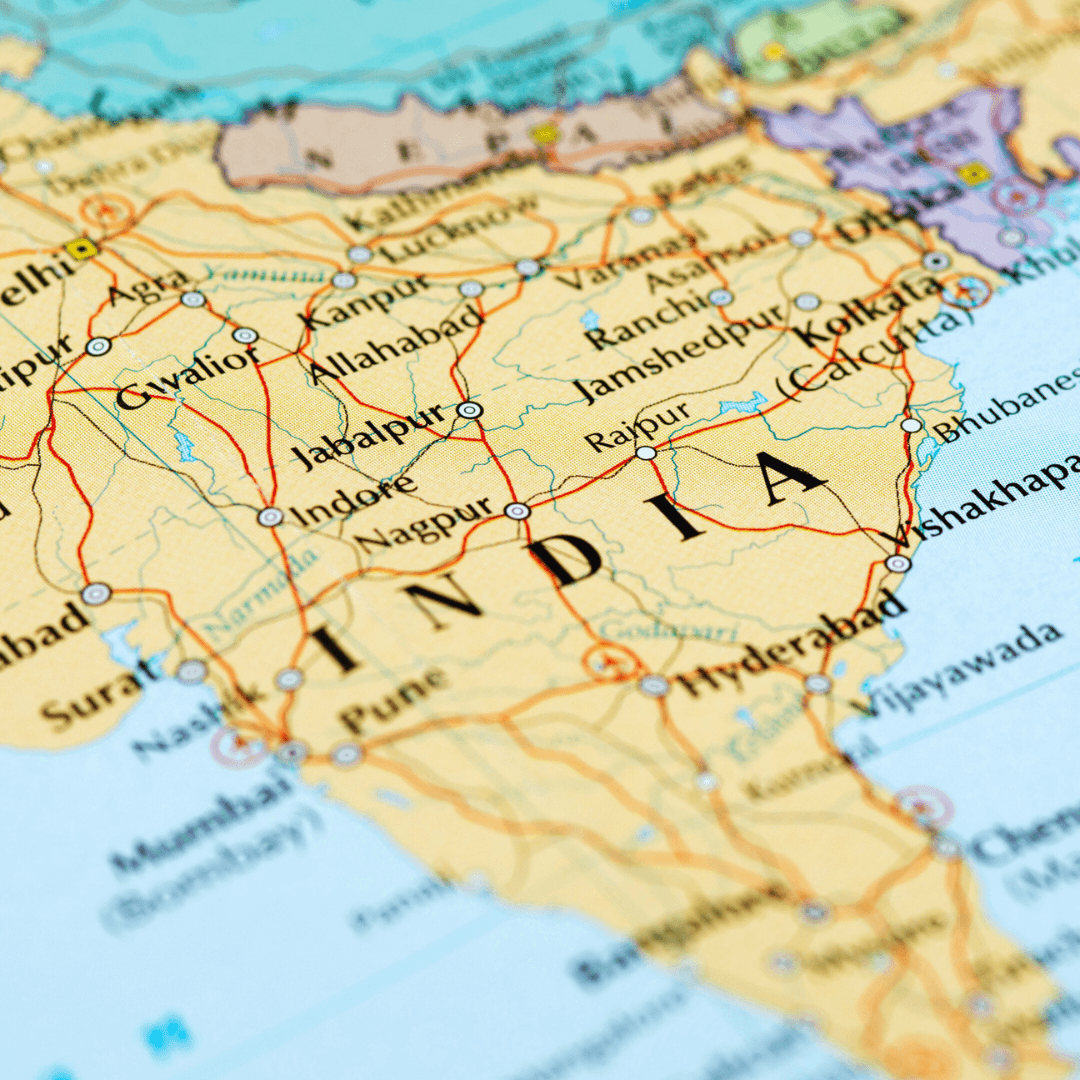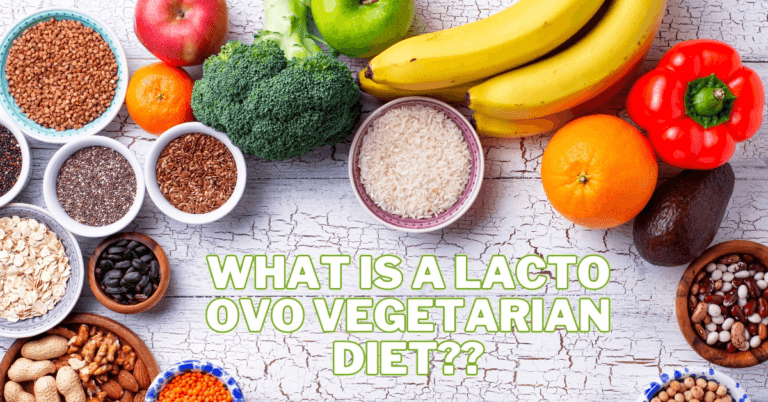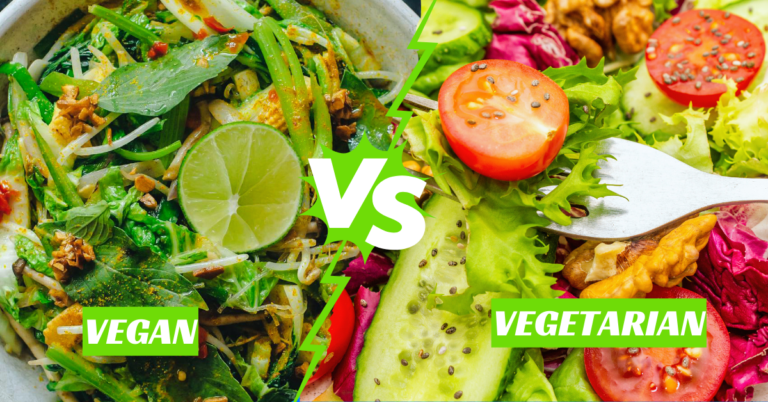Exploring The Top Vegetarian Countries Of The World

Exploring The Top Vegetarian Countries Of The World
In a world where dietary preferences vary greatly from one region to another, some countries have emerged as beacons of vegetarianism.
These nations embrace plant-based diets as a cultural norm and offer an array of delicious, wholesome vegetarian dishes that have become integral to their culinary traditions.
Whether driven by historical, religious, or environmental reasons, the commitment to vegetarianism in these countries provides a fascinating glimpse into how food choices can shape and reflect cultural identities.
Join us as we embark on a journey to discover the top vegetarian countries of the world and explore the vibrant flavours and rich traditions that make their plant-based cuisines truly exceptional.

1. India: The Heartland Of Vegetarianism
India, home to the world's largest vegetarian population, has a rich tradition of vegetarianism deeply rooted in its culture and religion.
Approximately 38% of Indians follow a vegetarian diet, translating to around 450 million people.
This widespread practice is influenced primarily by Hinduism, which promotes ahimsa (non-violence) and often advocates a meat-free diet.
Additionally, Jainism's strict adherence to non-violence has played a significant role in promoting vegetarianism throughout India.
The Indian government also supports this lifestyle, with many vegetarian options readily available in public institutions and food labelling regulations clearly distinguishing vegetarian products.

2. United States: A Growing Vegetarian Movement
Vegetarianism has gained traction in the United States over the past few decades. Around 5% of the population identifies as vegetarian, approximately 16 million.
Environmental sustainability, ethical concerns about animal care, and growing health benefits all contribute to the rise of vegetarianism in the United States.
The American vegetarian population is diverse, spanning various demographics and age groups, with a notable increase among younger generations.
The vegetarian and vegan products market has expanded significantly, with plant-based alternatives becoming more mainstream in grocery stores and restaurants nationwide.

3. Brazil: Embracing Vegetarianism Amidst A Meat-Centric Culture
Brazil, known for its barbecue and meat-heavy cuisine, has seen a surprising rise in vegetarianism, making it a notable country with the most vegetarian.
About 14% of Brazilians, or 29 million people, are vegetarian. Health concerns, environmental awareness, and animal rights activism drive this shift.
There is a growing trend toward plant-based diets in urban areas, especially among the younger population.
The Brazilian Vegetarian Society (SVB) has been instrumental in promoting vegetarianism through campaigns and educational initiatives.
Despite the country's strong meat-eating traditions, the increasing availability of vegetarian options in restaurants and supermarkets reflects this changing dietary landscape.

4. Germany: A Leader In The European Vegetarian Movement
Germany is at the forefront of the vegetarian movement in Europe, with approximately 10% of the population, or 8.2 million people, adhering to a vegetarian diet.
A thriving market for meat substitutes and plant-based products supports the country's robust vegetarian culture.
Environmental concerns, animal welfare, and health benefits are the primary motivators for Germans choosing a vegetarian lifestyle.
Cities such as Berlin are renowned for their diverse vegetarian and vegan restaurants, providing ample options for individuals looking to embrace and sustain this dietary choice.
The German Vegetarian Association (VEBU) plays a significant role in advocating for vegetarianism and supporting those transitioning.

5. Italy: A Mediterranean Approach To Vegetarianism
In Italy, approximately 8.9% of the population, or around 5.3 million people, are vegetarians.
The Mediterranean diet, which emphasizes fruits, vegetables, legumes, and grains, naturally aligns with vegetarianism.
Italians are increasingly adopting vegetarian diets due to health benefits and ethical considerations.
Plant-based and sustainable eating practices are promoted by the Slow Food movement, which has roots in Italy.
Italian cuisine offers a variety of vegetarian dishes, making it relatively easy for people to follow a meat-free diet.
As a result, the vegetarian population in Italy continues to grow, supported by cultural practices and modern dietary trends.

6. United Kingdom: A Rapidly Growing Vegetarian Population
The United Kingdom has experienced a significant rise in vegetarianism, with approximately 7% of the population, or around 4.7 million people, identifying as vegetarians, making it a leading country with the most number of vegetarians.
Concerns about animal welfare, environmental sustainability, and personal health drive the growth of the vegetarian movement in the UK.
Large cities such as London boast a thriving vegan and vegetarian cuisine scene, with many cafés and restaurants providing plant-based options.
The British Vegetarian Society also provides resources and support for individuals seeking a vegetarian diet.
The increasing popularity of meat substitutes and plant-based products in supermarkets further reflects this dietary shift.

7. Australia: A Nation Embracing Plant-Based Diets
Around 12% of Australia‘s population, or 3 million, follow a vegetarian diet. Environmental concerns, animal rights activism, and health consciousness drive this trend.
The Australian vegetarian population is diverse, with a notable increase among millennials and younger generations.
Major cities like Sydney and Melbourne boast a thriving vegetarian and vegan food culture, with numerous restaurants, cafes, and markets catering to plant-based diets.
The spread of vegetarianism in Australia is aided by the availability of vegetarian products in supermarkets and rising public knowledge of the advantages of a plant-based diet.

8. Canada: A Diverse And Growing Vegetarian Community
Canada has a growing vegetarian population, with approximately 9.4% of Canadians, or 3.2 million people, identifying as vegetarians.
Health considerations, environmental awareness, and ethical concerns regarding animal welfare drive this trend.
The Canadian vegetarian and vegan products market has expanded significantly, with more options in grocery stores and restaurants.
Cities like Toronto and Vancouver are known for diverse and vibrant vegetarian food scenes.
Support from organizations like the Toronto Vegetarian Association also helps promote vegetarianism and provides resources for those interested in adopting a plant-based diet.

9. Israel: A Vegetarian-Friendly Nation
Around 13% of Israel's population, or approximately 1.1 million people, adhere to a vegetarian diet.
A combination of health consciousness, ethical considerations, and religious beliefs influences the high prevalence of vegetarianism in Israel.
The Israeli cuisine, rich in fruits, vegetables, grains, and legumes, naturally supports a vegetarian diet.
Cities like Tel Aviv are renowned for their vegetarian and vegan-friendly dining options. Additionally, the Israeli Defense Forces offer soldiers vegetarian meals, reflecting the country's acceptance and accommodation of vegetarianism.
The strong cultural and societal support makes Israel one of the most vegetarian-friendly nations in the world.

10. Switzerland: A Health-Conscious Vegetarian Population
Switzerland has a notable vegetarian population, with approximately 5% of Swiss people, or around 400,000 individuals, following a vegetarian diet, making it a significant country with the most vegetarian.
The Swiss embrace vegetarianism primarily due to health reasons, environmental concerns, and animal welfare considerations.
The country's reputation for high-quality, fresh produce supports a plant-based diet. Swiss cities like Zurich and Geneva have many vegetarian restaurants and cafes.
The Swiss Vegetarian Society plays an active role in promoting vegetarianism and educating the public about its benefits.
The growing tendency of vegetarianism is also reflected in Swiss supermarkets' ever-increasing demand for plant-based products and meat alternatives.

11. Sweden: A Leader In Sustainable Eating
In Sweden, around 10% of the population, or approximately 1 million people, identify as vegetarians.
The Swedish embrace vegetarianism for health, environmental, and ethical reasons. The country is known for its progressive approach to sustainability and environmental issues, which supports the adoption of plant-based diets.
Major cities like Stockholm have a vibrant vegetarian and vegan food scene, with numerous restaurants offering plant-based options.
The Swedish Vegetarian Society and other organizations actively promote vegetarianism and provide resources for those interested in a plant-based diet.
The increasing availability of vegetarian products in supermarkets further supports this dietary trend.

12. Taiwan: A Cultural Embrace Of Vegetarianism
Taiwan has a significant vegetarian population, with around 13% of the people, or approximately 3 million individuals, adhering to a vegetarian diet.
The high prevalence of vegetarianism in Taiwan is influenced by Buddhist and Taoist dietary practices, which often promote a meat-free lifestyle.
The Taiwanese government also supports vegetarianism, with many vegetarian restaurants and food labelling regulations clearly distinguishing vegetarian products.
Cities like Taipei are known for their diverse and vibrant vegetarian food scenes. The strong cultural and religious support, combined with health and environmental awareness, makes Taiwan one of the leading countries in the world for vegetarianism.

13. Austria: A Growing Trend Of Vegetarianism
In Austria, approximately 9% of the population, or around 800,000 people, follow a vegetarian diet.
The Austrian acceptance of vegetarianism is motivated by environmental concerns, animal rights activism, and health conscience.
Major cities like Vienna have many vegetarian restaurants and cafes, making it easier for people to adopt a plant-based diet.
The Austrian Vegetarian Union is crucial in promoting vegetarianism and providing resources for individuals interested in this lifestyle.
The increasing availability of vegetarian products in supermarkets also supports the rising trend of vegetarianism in Austria.

14. Netherlands: A Progressive Approach To Vegetarianism
In the Netherlands, around 5% of the population, or approximately 850,000 people, identify as vegetarians, making it a notable country with the most number of vegetarians.
Health considerations, environmental sustainability, and ethical concerns regarding animal welfare influence the Dutch embrace of vegetarianism.
In major cities like Amsterdam, the vegetarian and vegan food scene thrives, with many restaurants and cafes offering plant-based options.
The Dutch Vegetarian Society significantly promotes vegetarianism and offers resources for those looking to adopt a plant-based diet.
The increasing availability of meat substitutes and vegetarian products in supermarkets reflects the growing trend of vegetarianism in the Netherlands.

15. Argentina: A Surprising Shift Towards Vegetarianism
Argentina, known for its meat-centric cuisine, has seen a surprising rise in vegetarianism.
Around 12% of Argentinians, or approximately 5 million people, now identify as vegetarians.
This change is motivated by health considerations, growing environmental awareness, and ethical concerns about animal welfare.
There is a growing trend toward plant-based diets in urban areas, especially among the younger population.
The availability of vegetarian options in restaurants and supermarkets is increasing, reflecting this dietary change.
The Argentine Vegetarian Union plays a significant role in promoting vegetarianism through campaigns and educational initiatives.

16. Mexico: Embracing Plant-Based Diets
In Mexico, around 19% of the population, or approximately 24 million people, follow a vegetarian diet.
Health consciousness, environmental concerns, and ethical considerations drive this trend.
Switching to a plant-based diet is easier as more vegetarian and vegan eateries open up in major cities like Mexico City.
The Mexican Vegetarian Society actively promotes vegetarianism and provides resources for individuals interested in this lifestyle.
The increasing availability of vegetarian products in supermarkets further supports the rise of vegetarianism in Mexico.

17. Russia: A Slowly Growing Vegetarian Movement
In Russia, about 3-4% of the population, roughly 4.5 million people, identify as vegetarians.
The Russian embrace of vegetarianism is driven primarily by health considerations and ethical concerns regarding animal welfare.
Major cities like Moscow and Saint Petersburg have a small but growing number of vegetarian restaurants and cafes.
The Russian Vegetarian Society and other organizations actively promote vegetarianism and provide resources for those interested in a plant-based diet.
The increasing availability of vegetarian products in supermarkets reflects the gradual rise of vegetarianism in Russia.

18. New Zealand: A Nation Of Health-Conscious Vegetarians
In New Zealand, around 10% of the population, or approximately 500,000, follow a vegetarian diet.
This trend is driven by health consciousness, environmental concerns, and ethical considerations regarding animal welfare.
Major cities like Auckland and Wellington have a vibrant vegetarian and vegan food scene, with numerous restaurants and cafes offering plant-based options.
The New Zealand Vegetarian Society is crucial in promoting vegetarianism and providing resources for individuals interested in this lifestyle.
The increasing availability of vegetarian products in supermarkets further supports the rise of vegetarianism in New Zealand.

19. Spain: A Mediterranean Shift Towards Vegetarianism
In Spain, around 9% of the population, or approximately 4.1 million people, identify as vegetarians, making it a significant country with the most number of vegetarians.
The abundant fruits, vegetables, grains, legumes, and legume-based Mediterranean diets naturally support vegetarianism.
Spaniards increasingly adopt vegetarian diets due to health benefits, environmental concerns, and ethical considerations.
Cities like Barcelona and Madrid are known for their vibrant vegetarian and vegan food scenes, with numerous restaurants and cafes offering plant-based options.
The Spanish Vegetarian Union promotes vegetarianism and provides resources for individuals interested in this lifestyle.
The growing demand for vegetarian products in supermarkets also reflects the rising trend of vegetarianism in Spain.

20. France: Embracing Plant-Based Diets In A Culinary Capital
In France, approximately 5% of the population, or around 3.3 million people, follow a vegetarian diet.
The French embrace of vegetarianism is driven by health consciousness, environmental sustainability, and ethical concerns.
Major cities like Paris have a burgeoning vegetarian and vegan food culture, with many restaurants offering plant-based options.
The French Vegetarian Society actively promotes vegetarianism and provides information for individuals interested in switching to a plant-based diet.
The increasing availability of meat substitutes and vegetarian products in supermarkets supports the growing trend of vegetarianism in France.

21. South Korea: A Rising Trend In Vegetarianism
In South Korea, around 3% of the population, or approximately 1.5 million people, identify as vegetarians.
Health considerations, environmental awareness, and ethical concerns regarding animal welfare influence the rise of vegetarianism in South Korea.
People can more easily switch to a plant-based diet because of the increasing number of vegetarian and vegan restaurants in big cities like Seoul.
The Korean Vegetarian Union actively promotes vegetarianism through campaigns and educational initiatives.
The growing availability of vegetarian products in supermarkets reflects the gradual shift towards vegetarianism in South Korea.

22. South Africa: A Diverse And Growing Vegetarian Community
In South Africa, approximately 3.5% of the population, or around 2 million people, follow a vegetarian diet.
Health considerations, environmental concerns, and ethical reasons drive South Africans' embrace of vegetarianism.
Major cities like Cape Town and Johannesburg have a vibrant vegetarian and vegan food scene, with numerous restaurants and cafes offering plant-based options.
The South African Vegetarian Society is crucial in promoting vegetarianism and providing resources for individuals interested in this lifestyle.
The increasing availability of vegetarian products in supermarkets further supports the rise of vegetarianism in South Africa.
FAQ:
1. Which Is The World's Only Vegetarian City?
Answer: The world's only vegetarian city is Palitana, which is in Gujarat. Palitana is renowned for its strong adherence to vegetarianism due to the influence of Jainism, which promotes a strict vegetarian lifestyle as part of its principle of non-violence.
2. Are There Any Countries Where Vegetarianism Is Uncommon?
Answer: Yes, there are countries where vegetarianism is relatively uncommon. For instance, meat is central to traditional diets in the United States, Brazil, and Argentina.
Likewise, meat and seafood are staple components of the cuisine in China, Japan, and South Korea.
While vegetarianism is gradually gaining traction in these places due to health and ethical concerns, it remains less prevalent than in other regions.
Conclusion
In conclusion, as we’ve explored the top vegetarian countries of the world, it’s clear that vegetarianism is not just a dietary choice but a reflection of cultural values, traditions, and a deep respect for nature.
From the bustling markets of India to the serene landscapes of Greece, these countries showcase how plant-based diets can be both diverse and delicious.
Embracing vegetarianism in these regions highlights a broader commitment to sustainability, health, and ethical eating.
Whether you’re a seasoned vegetarian or simply curious about global culinary practices, these nations' rich and varied vegetarian offerings offer inspiration and insight into how food can unite us across cultures.
So, next time you explore new cuisines, consider delving into the vibrant vegetarian dishes these countries proudly serve.
I trust you enjoyed reading the article about the Countries With The Highest Rates Of Vegetarianism. Please stay tuned. More blog posts will be posted very shortly.
JeannetteZ
>>>Please click here to read my Vegan Travel Guides To World Destinations<<<
>>>Do You Want To Learn How To Create Delicious, Cruelty-Free, Healthy AND 100% Vegan Meals? Try These Awesome Vegan Cooking Courses With A Free 7-DAY MEMBERSHIP<<<
Your Opinion Is Important To Me
Do you have thoughts, ideas, or questions? I would love to hear from you. Please leave me your questions, experience, and remarks about Exploring The Top Vegetarian Countries Of The World in the comments section below. You can also email me at Jeannette@LivingTheVeganLifestyle.org.
Disclosure
This post may contain affiliate links. I earn from qualifying purchases as an Amazon Associate and other affiliate programs. Please read my full disclosure.
Here are some links to some of my favourite articles:
Why Some People Don't Like Vegans






